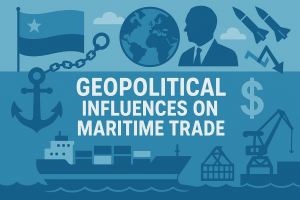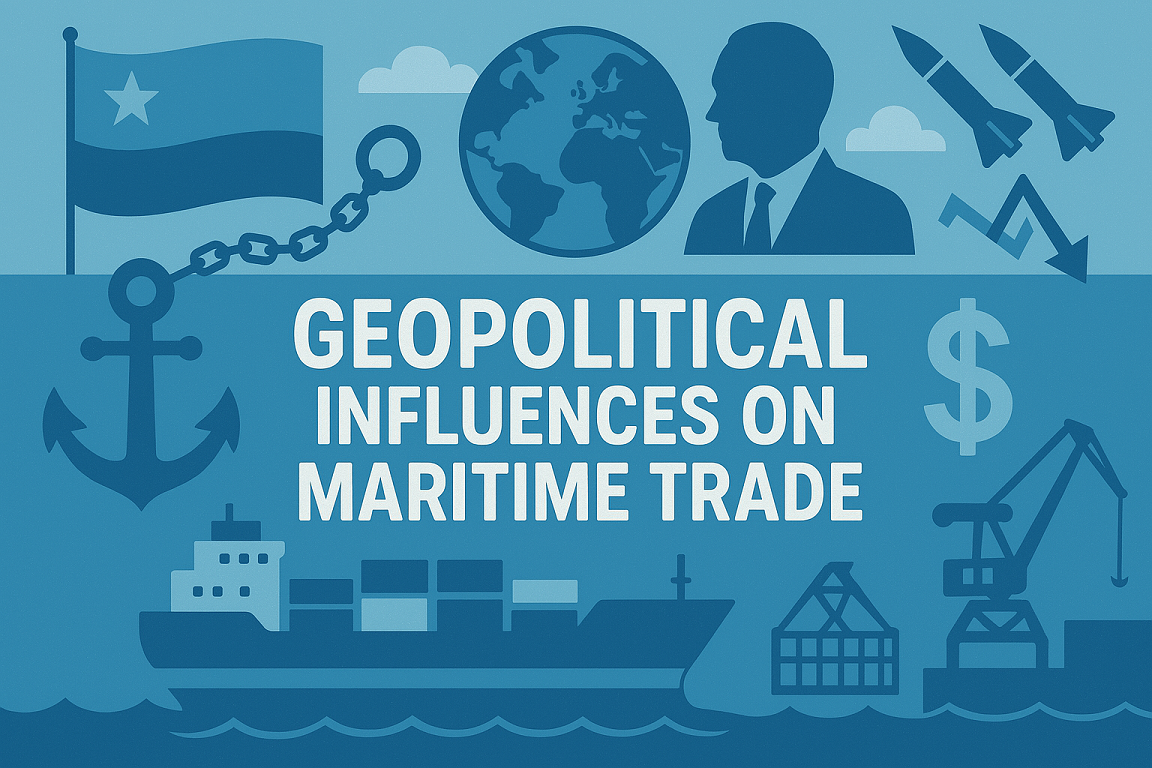04/13/2025
Discover how geopolitics impacts maritime trade through controversial remarks, sanctions, and the rise of dark fleets. Learn how global shipping adapts to uncertainty in the Panama Canal and beyond.

🚢 🌍Can Politics Block Global Trade?
What happens when a single political statement or international sanction redirects billions of dollars in global shipping? In the maritime industry, geopolitical influences ripple across oceans, affecting ports, pricing, routes, and cargo flows.
From Donald Trump’s widely circulated comments on the Panama Canal to the increasing use of sanctions and dark fleets, geopolitics has become a decisive factor in maritime economics and supply chain stability.
🌍⚓ Key Concepts: How Geopolitics Shapes Global Shipping
🔑 What Is Geopolitical Influence in Maritime Trade?
Geopolitical influence refers to the way political relationships, conflicts, and policies—especially between countries—impact maritime activities like port access, fuel costs, trade lanes, and fleet operations.
Trump’s Comments on the Panama Canal: What Was Said and Why It Matters
In early 2024, former U.S. President Donald Trump criticized the U.S. for ‘giving away’ the Panama Canal, reviving debates over its sovereignty and strategic control. The Panama Canal, handed over to Panama in 1999, is one of the most important maritime chokepoints in the world.
🌎 Why It Matters:
-
The Panama Canal connects Atlantic and Pacific trade routes, handling ~5% of global maritime trade.
-
Trump’s rhetoric triggered concerns over U.S. influence, Chinese investments in Panamanian infrastructure, and control of global chokepoints.
🔍 Quote: “We built it, we paid for it, and now we don’t control it.” — Donald J. Trump
🛑 Implications for Global Shipping:
-
Reignited concerns about canal neutrality and control
-
Spotlight on China’s Belt and Road investments in Central America
-
Increased calls for alternative routes like the Arctic corridor and expanded U.S. port infrastructure
🚫 Sanctions & Shipping: A Modern Maritime Battlefield
🧩 What Are Maritime Sanctions?
Sanctions restrict the movement, financing, or insurance of ships and cargo from certain countries. These are often imposed to influence political decisions or punish violations of international law.
🏴 Common Maritime Sanctions:
-
Oil and LNG bans (e.g., Iran, Russia, Venezuela)
-
Ship registry cancellations
-
Blacklisting vessels and banning insurance coverage
🔍 Case Study: Russia & Ukraine Conflict (2022–present)
-
Western sanctions led to the redirection of Russian oil via shadow tankers
-
Price caps on Russian crude forced traders to form alternative logistics chains, often using older vessels and unsanctioned ports
🌑 Dark Fleets: The Shadow Side of Maritime Logistics
💡 What Is a Dark Fleet?
A dark fleet refers to a group of ships that operate outside official tracking systems, often disabling their AIS (Automatic Identification System) to avoid sanctions or hide illicit activity.
🔦 Characteristics:
-
Aged vessels (20+ years old)
-
Frequently switch flags of convenience
-
Use ship-to-ship transfers in open waters
-
Turn off tracking during sensitive voyages
📍 Hotspots:
-
South China Sea
-
Eastern Mediterranean
-
Black Sea and Indian Ocean
📊 Estimated 600+ vessels are part of the growing “dark fleet” transporting sanctioned oil and cargo globally (Lloyd’s List Intelligence, 2024)
📈 Global Impact: How Geopolitics Changes Shipping Routes and Costs
| 🌐 Geopolitical Event | 🛳️ Maritime Impact |
|---|---|
| U.S.–China trade tensions | Shift in Asia–U.S. container routes |
| Red Sea attacks | Ships rerouted via Cape of Good Hope |
| Russian oil sanctions | Rise of dark fleet and spike in ship insurance |
| Taiwan Strait tension | Risk of closure to a major global container route |
| Trump’s Canal remarks | Renewed scrutiny over control of critical chokepoints |
📊 Key Stats & Trends (2024–2025)
-
🌎 Over 80% of global trade is transported by sea
-
🚫 Sanctioned or semi-sanctioned shipping now makes up nearly 10% of oil tanker activity globally
-
🔒 Dark fleet activity has doubled since 2021 due to Russia-related restrictions
-
💸 Maritime insurance costs on high-risk routes (e.g., Red Sea) have risen by up to 400%
🔍 Educational & Industry Applications
🎓 For Students & Researchers:
-
Explore international maritime law, sanctions compliance, and geopolitical mapping
-
Study the effect of strategic chokepoints like the Suez Canal, Strait of Hormuz, and Panama Canal
⚓ For Professionals & Companies:
-
Incorporate risk management, alternative route planning, and compliance protocols
-
Invest in real-time AIS tracking, dark fleet monitoring tools, and maritime security audits
❓ FAQs – People Also Ask
❓What did Donald Trump say about the Panama Canal?
Trump suggested the U.S. should never have relinquished control over the Panama Canal, raising concerns about national security and geopolitical influence.
❓What is a dark fleet in maritime shipping?
A dark fleet is a group of ships that intentionally go “dark” by switching off tracking systems to avoid sanctions or hide illicit trade, especially in oil.
❓How do sanctions affect maritime trade?
Sanctions limit vessel access to global ports, financial systems, and insurance, leading to longer routes, higher costs, and the growth of gray-market logistics.
❓Why is the Panama Canal geopolitically important?
It connects the Atlantic and Pacific Oceans and is a strategic passage for global shipping, saving time and fuel for transcontinental voyages.
🧭 Conclusion: Shipping in the Crosshairs of Politics
In today’s interconnected world, geopolitics no longer lives on land alone—it sails across oceans. From presidential remarks that stir international debate to shadowy fleets defying sanctions, the maritime domain is at the heart of global strategy.
For shipping companies, seafarers, students, and policymakers, understanding these geopolitical dynamics is essential to navigate the unpredictable seas of the future.
🌐 Stay informed and resilient.
Explore more insights at MaritimeEducation.com to stay ahead of global shipping trends, security risks, and maritime developments.


I really like your blog.. very nice colors &
theme. Did you design this website yourself or did you hire someone to do it for you?
Plz respond as I’m looking to create my own blog and would like to find out where u got this
from. thanks a lot